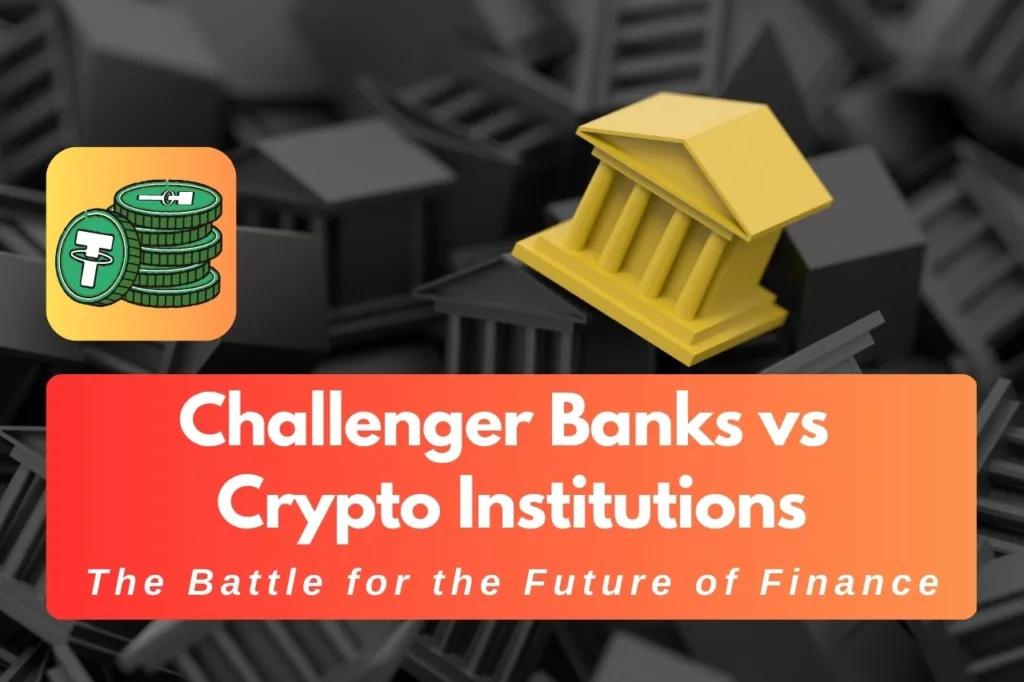The Battle for the Future of Finance

The financial industry has undergone a significant transformation over the last few decades. The emergence of challenger banks and cryptocurrencies has disrupted the traditional financial landscape. Challenger banks and crypto institutions have both upended the established order to provide customers with alternatives to traditional banks. In this article, I will explore the differences between challenger banks and crypto institutions, the overlap between the two, the rise of crypto banking, and the future of finance.
Challenger Banks
Challenger banks are relatively new entrants in the financial industry that are known for their digital-first approach. They provide a range of financial services that can be accessed online and through mobile apps. Challenger banks offer a substitute for conventional banks and concentrate on delivering a seamless and practical user experience. They frequently offer better interest rates, lower fees, and extra features like budgeting tools, savings objectives, and financial guidance.
The banking sector has been shaken up by challenger banks by giving customers more options. They are especially well-liked by millennials and other digital natives who favor online banking over traditional banking. Challenger banks like Revolut, Monzo, and N26 are some of the well-known ones.
Crypto Institutions
The larger cryptocurrency industry includes institutions that deal in cryptocurrencies. They provide decentralized financial services that are based on blockchain technology. Cryptocurrency institutions provide a variety of services, including cryptocurrency exchanges, wallets, and platforms for lending and borrowing. They offer a substitute for established financial institutions and are renowned for their openness, security, and adaptability.
By giving customers access to decentralized financial (DeFi) products, cryptocurrency institutions have upended the financial sector. DeFi is a new financial system based on blockchain technology that aims to be open, transparent, and available to all. It gives users control over their money and does away with the need for middlemen like banks. Binance is a well-known cryptocurrency company.
The Overlap
There is an overlap between challenger banks and crypto institutions. Both provide alternatives to traditional banking and offer digital solutions. However, there are significant differences between the two. While crypto institutions are frequently unregulated and offer services based on cryptocurrencies, challenger banks are financial institutions that are regulated and offer services based on fiat currency.
Crypto institutions offer users more control over their funds and provide greater transparency, but they are also riskier than traditional banks. Challenger banks, on the other hand, offer users a higher degree of safety and security but are not as transparent as crypto institutions. The user experience also differs, with challenger banks emphasizing a smooth and convenient experience while crypto institutions emphasize greater control and flexibility.
Crypto Banking
Crypto banking is the future of finance, with the potential to revolutionize the financial industry. By combining cryptocurrency and conventional banking, it offers users the best of both worlds. Users can access traditional banking services like loans, savings, and payments through cryptocurrency banking, which also gives users access to decentralized financial products like lending, borrowing, and staking.
Crypto banking is still in its early stages, and there are only a few crypto banks currently operating. However, more crypto banks are anticipated to appear as cryptocurrency’s popularity increases. Crypto banks have the potential to disrupt traditional banking and provide users with a more decentralized and transparent financial system.
Final Thoughts
Challenger banks and crypto institutions have disrupted the financial industry and provided consumers with more choices and better options. Both have their strengths and weaknesses, and there is an overlap between the two. The advantages of both conventional banking and cryptocurrency are offered to users by crypto banking, which is the financial system of the future. As the popularity of cryptocurrency continues to grow, it is expected that more crypto banks will emerge, challenging the traditional banking system and revolutionizing it.



